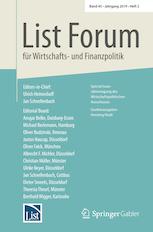
Der Euro als Triebfeder des deutschen Exports?
Die ausufernde Verschuldung insbesondere der südeuropäischen Mitgliedstaaten stellt die Europäische Währungsunion (EWU) derzeit vor große Herausforderungen. Während über lange Zeit Einigkeit darüber herrschte, den vollständigen Erhalt der Währungsunion mit einem milliardenschweren Rettungsschirm zu sichern, wurden jüngst erste Forderungen nach einem Austritt Griechenlands aus dem Euroraum laut. Insbesondere in Deutschland wird befürchtet, dass ein Austritt einzelner Länder oder gar ein kompletter Zerfall der Währungsunion mit großen ökonomischen Nachteilen verbunden wäre. So wird argumentiert, dass gerade Deutschland aufgrund seiner hohen Exportorientierung und jahrelanger Lohnzurückhaltung mehr als alle anderen EWU-Mitgliedsländer vom Euro profitiere. Vor diesem Hintergrund untersucht der vorliegende Beitrag, welche Konsequenzen ein Austritt einzelner Länder aus der Währungsunion und damit verbundene Veränderungen der preislichen Wettbewerbsfähigkeit auf die deutschen Ausfuhren in diese Länder hätte. Im Ergebnis zeigt sich, dass sich ein Austritt Irlands, Griechenlands, Spaniens und Portugals kaum negativ auf die deutschen Exporte auswirken würde. Ein kompletter Zerfall der Währungsunion und eine Wiedereinführung nationaler Währungen dürfte dagegen, aufgrund der nach wie vor recht hohen Bedeutung des Euroraums als Absatzmarkt für deutsche Produkte, den Exportzuwachs spürbar dämpfen.




